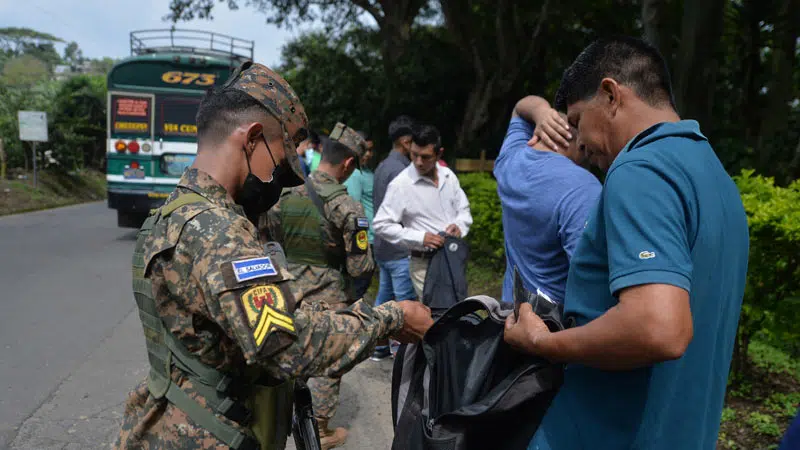Although the general population has a favorable opinion of the state of exception, they are aware that it is vulnerable to having their human rights violated, explained Omar Serrano, vice-rector of social projection at the Central American University José Simeón Cañas, UCA.
The fourth measurement of the state of exception carried out by the University Institute of Public Opinion of the UCA (Iudop), two years after its implementation, revealed in different variables that the population believes that government institutions can violate their rights by not respecting due process, shielded by the state of exception.
“In a hypothetical case, if a relative of someone who is innocent is arrested under the state of exception, more than 60% do not trust that the Police will protect them because they are innocent,” said Serrano.
Likewise, 57% said they would not trust the Prosecutor’s Office to gather evidence to prove whether the person is innocent or not, and 54% said they do not trust the judicial system to free them if they are innocent.
“People know that rights are being violated, but we have been sold the idea that security and human rights are opposed, and that is false because true peace comes from respect for human rights,” explained Serrano.
The academic noted that the population knows there are innocent people arrested, the survey indicates that 30% of the population know people who are not linked to gangs and have been arrested.
“They know, but in the balance between security and disrespect for human rights, they prefer security, although they are aware that if it happens to them or a relative, the treatment will not be fair,” said the vice-rector.
According to the latest report on human rights violations carried out by seven social organizations, of the 6,305 complaints of violations, 94% correspond to arbitrary detentions, 87% are related to disrespect for due process, and 11% reported home invasion.
According to the UCA survey, the detention of innocent people is one of the failures that 36.6% of the population points out, while 41.6% said they find no failure in the implementation of this measure.
“A smaller group mentioned the abuse on the part of police and military personnel that was being committed during this period, also the loss of some rights and the express violation of human rights, arbitrary arrests without having any type of investigation,” added Laura Andrade, director of Iudop.
EDH: https://www.elsalvador.com/noticias/nacional/regimen-de-excepcion-encuesta-iudop/1136625/2024/
Población señala capturas arbitrarias como un fracaso del régimen, según encuesta IUDOP
Aunque la población en general tiene una opinión favorable sobre el régimen de excepción está consciente que es vulnerable a que se le puedan violar sus derechos humanos con el mismo, explicó, Omar Serrano, vicerrector de proyección social de la Universidad Centroamericana José Simeón Cañas, UCA.
La cuarta medición del régimen de excepción realizada por el Instituto Universitario de Opinión Pública de la UCA (Iudop), a los dos años de su implementación, reveló en diferentes variables que la población considera que las instituciones gubernamentales pueden violar sus derechos al no respetar un debido proceso, amparadas en el estado de excepción.
“En un caso hipotético si un familiar de alguien, que es inocente, es capturado bajo el régimen de excepción más del 60% no confía en que la Policía lo va a salvaguardar porque es inocente” manifestó Serrano.
Asimismo el 57% dijo que no confiaría en que la Fiscalía que va a recabar las pruebas para demostrar si la personas es inocente o no y un 54% aseguró que no confía en que el sistema judicial lo va a dejar libre si es inocente.
“La gente sabe que se están violando derechos, pero nos han vendido la idea que seguridad y derechos humanos son contrapuestos y eso es falso porque la paz verdadera viene del respeto a los derechos humanos” explicó Serrano.
El académico manifestó que la población sabe que hay gente inocente capturada, la encuesta indica que el 30% de la población conoce a personas que no están vinculadas a las maras y pandillas y que han sido capturadas.
“Ellos saben, pero en la balanza entre la seguridad y el irrespeto a los derechos humanos, prefieren la seguridad, aunque están conscientes que si les toca a ellos o a un familiar no será justo el trato que les den” expuso el vicerrector.
Según el último informe de violaciones a derechos humanos realizado por siete organizaciones sociales de la 6, 305 denuncias de violaciones el 94% corresponde a detenciones arbitrarias, un 87% están relacionados al irrespeto al debido proceso y un 11% reportó allanamiento de morada.
Según la encuesta de la UCA la detención de personas inocentes es uno de los fracasos que señala un 36.6% de la población, mientras que un 41.6% dijo que no encuentra ningún fracaso en la implementación de esta medida.
“Un grupo más pequeño mencionó el abuso de parte de los policías y militares que se estaba cometiendo en este periodo, también la perdida de algunos derechos y la violación expresa de los derechos humanos, las capturas arbitrarias sin tener ningún tipo de investigación” agregó Laura Andrade, directora del Iudop.
EDH: https://www.elsalvador.com/noticias/nacional/regimen-de-excepcion-encuesta-iudop/1136625/2024/

